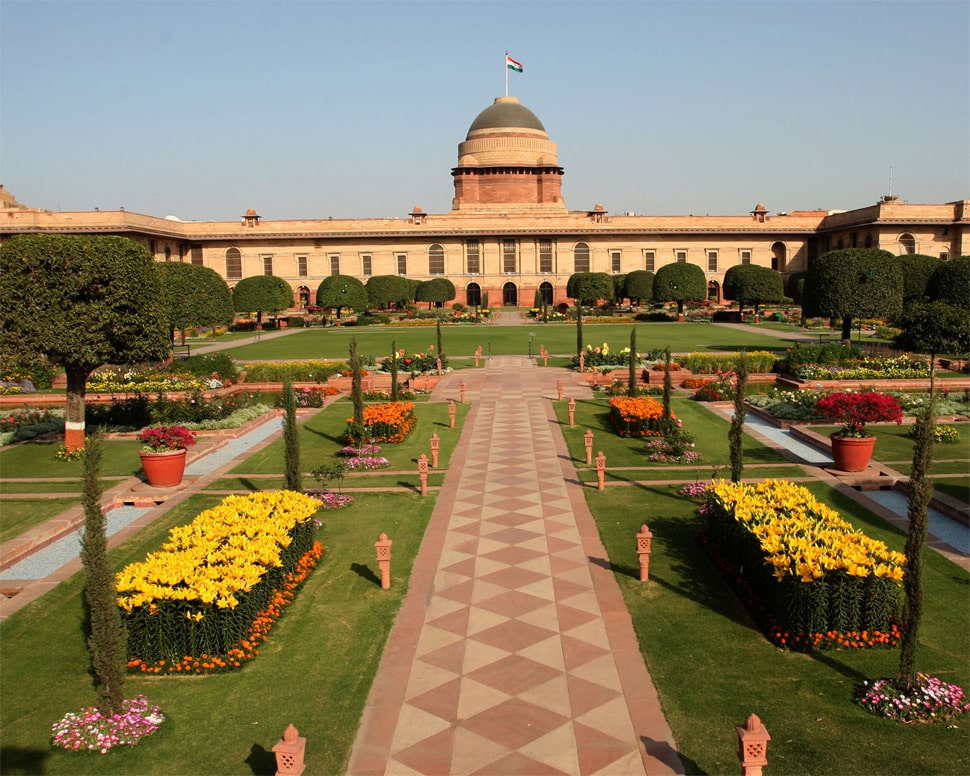Features of Mughal Gardens:
- These are developed in Islamic architectural style by the Mughals in India and other countries.
- These gardens are frequently seen as a place for relaxation and meditation.
- Examples: The Taj Mahal Garden, Agra Fort, Humayun’s Tomb Garden, and the Red Fort Garden.
- Design:
- This gardening design was influenced by Persian, namely the Charbagh structure.
- Gardens are formal in style; symmetrically designed in rectangular or square plots.
- The garden area is divided into four plots by water channels. These four channels represent four rivers of life.
- The running water provides coolness and freshness to the garden.
- The four plots are planted with trees, shrubs, etc.,
- The axis is straight and central and sometimes represented by trees line.
- The water pool created in the centre with over flowing water serves as the central specimen.
- Fountains, cascades are linked to the central pool to create scenic beauty.
- Mughal gardens are surrounded by a high, robust wall. The wall’s summit is decorated with serrated battlements.
- The entrances are often towering and beautiful. The doors are massive wooden structures studded with hefty iron nails and spikes.
Q1) What is a Charbagh Structure?
Charbagh or Chahar Bagh (Persian: چهارباغ, chahār bāgh, meaning “Four Bāghs” (“four gardens”)) is a Persian and Islamic quadrilateral garden layout based on the four gardens of Paradise mentioned in the Qur’an.
Source: Mughal Gardens renamed as Amrit Udayan: VHP backs move, Opposition has this to say
Last updated on February, 2026
→ UPSC Notification 2026 is now out on the official website at upsconline.nic.in.
→ UPSC IFoS Notification 2026 is now out on the official website at upsconline.nic.in.
→ UPSC Calendar 2026 has been released.
→ Check out the latest UPSC Syllabus 2026 here.
→ Join Vajiram & Ravi’s Interview Guidance Programme for expert help to crack your final UPSC stage.
→ UPSC Mains Result 2025 is now out.
→ UPSC Prelims 2026 will be conducted on 24th May, 2026 & UPSC Mains 2026 will be conducted on 21st August 2026.
→ The UPSC Selection Process is of 3 stages-Prelims, Mains and Interview.
→ Prepare effectively with Vajiram & Ravi’s UPSC Prelims Test Series 2026 featuring full-length mock tests, detailed solutions, and performance analysis.
→ Enroll in Vajiram & Ravi’s UPSC Mains Test Series 2026 for structured answer writing practice, expert evaluation, and exam-oriented feedback.
→ Join Vajiram & Ravi’s Best UPSC Mentorship Program for personalized guidance, strategy planning, and one-to-one support from experienced mentors.
→ UPSC Result 2024 is released with latest UPSC Marksheet 2024. Check Now!
→ UPSC Toppers List 2024 is released now. Shakti Dubey is UPSC AIR 1 2024 Topper.
→ Also check Best UPSC Coaching in India






















